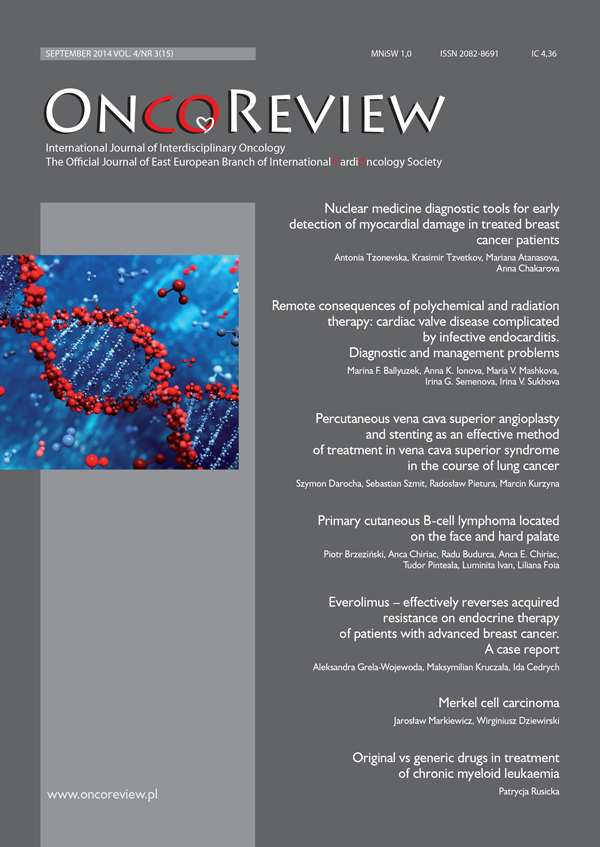Everolimus – effectively reverses acquired resistance on endocrine therapy of patients with advanced breast cancer. A case report Case report
Main Article Content
Abstract
Breast cancer is the most common malignancy among women in Poland. Endocrine therapy is the first line of treatment in hormone- -receptor-positive advanced breast cancer. Progression during endocrine therapy is unavoidable. Administration of mTOR inhibitor gives a chance of reversing the acquired resistance. This paper presents a case report of a patient with metastatic breast cancer successfully treated with everolimus added to endocrine therapy.
Downloads
Article Details

This work is licensed under a Creative Commons Attribution-NonCommercial 4.0 International License.
Copyright: © Medical Education sp. z o.o. This is an Open Access article distributed under the terms of the Attribution-NonCommercial 4.0 International (CC BY-NC 4.0). License (https://creativecommons.org/licenses/by-nc/4.0/), allowing third parties to copy and redistribute the material in any medium or format and to remix, transform, and build upon the material, provided the original work is properly cited and states its license.
Address reprint requests to: Medical Education, Marcin Kuźma (marcin.kuzma@mededu.pl)
References
2. Wojciechowska U., Didkowska J., Zatoński W.: Prognozy zachorowalności i umieralności na nowotwory złośliwe w Polsce do 2025 r. Krajowy Rejestr Nowotworów, Centrum Onkologii Instytutu im. M. Skłodowskiej-Curie.
3. Blamey R.W., Cataliotti L.: EUSOMA accreditation of breast units. Eur. J. Cancer 2006; 42: 13331-1337.
4. Wilcken N., Hornblucke J., Ghersi D.: Chemotherapy alone versus endocrine therapy alone for metastatic breast cancer. Cochrane Database Syst. Rev. 2003; (2): CD002747.
5. Wong M.H.F., Stockler M., Pavlakis N.: Bisphosphonates and other bone agents for breast cancer. Cochrane Library February 2012.
6. Van Poznak C.H., Temin S., Yee G.C. et al.: American society of clinical oncology executive summary of the clinical practice guideline update on the role of bone-modifying agents in metastatic breast cancer. J. Clin. Oncol. 2011; 29(9): 1221-1227.
7. Cardoso F., Costa A., Norton L. et al.: 1st International consensus guidelines for advanced breast cancer (ABC 1). The Breast 2012; 21(3): 242-252.
8. Łacko A., Duchnowska R.: The place of exemestane in the treatment of advanced breast cancer in postmenopausal patients. Onkol. Prakt. Klin. 2012; 8(6): 246-251.
9. Wojtukiewicz M., Sierko E.: Leczenie ukierunkowane na cele molekularne w onkologii i hematoonkologii. Via Medica 2013.
10. Baselga J., Campone M., Piccart M. et al.: Everolimus in post-menopausal hormone-receptor-positive advanced breast cancer. N. Engl. J. Med. 2012; 366: 520-529.
11. Amir E., Miller N., Geddie W. et al.: Prospective study evaluating the impact of tissue confirmation of metastatic disease in patients with breast cancer. J. Clin. Oncol. 2012; 30: 587-592.
12. Simmonds C., Miller N.,Geddie W. et al.: Does confirmatory tumor biopsy alter the management of breast cancer with distant metastases? Ann. Oncol. 2009; 20: 1499-1504.
13. Cardoso F., Fallowfield L., Costa A. et al.; ESMO Guidelines Working Group: Locally recurrent or metastatic breast cancer: ESMO clinical practice guidelines for diagnosis, treatment and follow-up. Ann. Oncol. 2011; 22(suppl. 6): 25-30.

